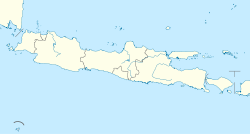Cibinong
Cibinong
ᮎᮤᮘᮤᮔᮧᮀ | |
|---|---|
 Lake of Setu Cibinong | |
 Cibinong | |
| Coordinates: 6°29′06″S 106°50′31″E / 6.485°S 106.842°ECoordinates: 6°29′06″S 106°50′31″E / 6.485°S 106.842°E | |
| Country | |
| Province | West Java |
| Regency | Bogor Regency |
| Government | |
| • Camat | Bambang Widodo Tawekal |
| • Secretary | Andri Rahman |
| Area | |
| • Total | 46.62 km2 (18.00 sq mi) |
| Elevation | 130 m (430 ft) |
| Population (2020 Census)[1] | |
| • Total | 363,424 |
| • Density | 7,800/km2 (20,000/sq mi) |
| Time zone | UTC+7 (IWST) |
| Area code | (+62) 251 |
| Vehicle registration | F |
| Villages | 13 |
| Website | Official website |
Cibinong (Sundanese: ᮎᮤᮘᮤᮔᮧᮀ) is a district in Bogor Regency, West Java, Indonesia which serves as the Regency's capital. Cibinong District had 363,424 inhabitants at the 2020 Census.[2]
The Science Center of Indonesian Institute of Sciences (Lembaga Ilmu Pengetahuan Indonesia) is located in the district.[3] Cibinong contains a swamp forest, which is already mentioned by van Steenis in 1933, called Rawa (Swamp) Siradayah, and it still preserved until present time.[4][5]
Cuisine specialities of Cibinong include laksa cibinong and Mie ayam (Chicken noodles) due to the strong influence of Chinese community. Laksa is a spicy noodle soup from the Peranakan culture. Laksa Cibinong is a kind of thick yellowish coconut milk based soup, produced by a mixture of some spices, and it is served with bean sprout, rice vermicelli (bihun), hard-boiled eggs, cooked shredded chicken, fried shallots and Indonesian lemon-basil leaves. Sometime they are also served with rice cake (lontong). Mie ayam is easily found everywhere, as a cheap food for factory workers and school students. There are basically two preparation styles, one is more Indonesian in style (with Indonesian spices, sweet soy sauce, saos sambel), and the other one is more Chinese (using for example star anise, sesame oil or soy sauce). Most of the places offers, in addition to noddle, kwetiau or bihun.
Chinese Peranakan culture can be seen at the Chinese Temple Ho Tek Bio near Cibinong market, during Imlek or Chinese New Year. Near the market, in front of the lake, there is a Chinese cemetery compound (Sentiong).
Administrative divisions[]
Cibinong district is divided into 13 administrative villages which are as follows:[1]
- Cibinong
- Cirimekar
- Ciriung
- Harapan Jaya
- Karadenan
- Nanggewer
- Nanggewer Mekar
- Pabuaran
- Pabuaran Mekar
- Pakansari
- Pondok Rajeg
- Sukahati
- Tengah
Climate[]
Cibinong has a tropical rainforest climate (Af) with heavy to very heavy rainfall year-round.
| Climate data for Cibinong | |||||||||||||
|---|---|---|---|---|---|---|---|---|---|---|---|---|---|
| Month | Jan | Feb | Mar | Apr | May | Jun | Jul | Aug | Sep | Oct | Nov | Dec | Year |
| Average high °C (°F) | 29.1 (84.4) |
29.4 (84.9) |
30.2 (86.4) |
31.0 (87.8) |
31.2 (88.2) |
31.2 (88.2) |
31.3 (88.3) |
31.8 (89.2) |
32.1 (89.8) |
32.0 (89.6) |
31.3 (88.3) |
30.5 (86.9) |
30.9 (87.7) |
| Daily mean °C (°F) | 25.6 (78.1) |
25.7 (78.3) |
26.0 (78.8) |
26.6 (79.9) |
26.6 (79.9) |
26.2 (79.2) |
26.1 (79.0) |
26.3 (79.3) |
26.6 (79.9) |
26.8 (80.2) |
26.7 (80.1) |
26.4 (79.5) |
26.3 (79.4) |
| Average low °C (°F) | 22.1 (71.8) |
22.0 (71.6) |
21.9 (71.4) |
22.2 (72.0) |
22.1 (71.8) |
21.3 (70.3) |
20.9 (69.6) |
20.8 (69.4) |
21.1 (70.0) |
21.7 (71.1) |
22.1 (71.8) |
22.3 (72.1) |
21.7 (71.1) |
| Average rainfall mm (inches) | 371 (14.6) |
330 (13.0) |
334 (13.1) |
371 (14.6) |
305 (12.0) |
192 (7.6) |
170 (6.7) |
193 (7.6) |
210 (8.3) |
298 (11.7) |
313 (12.3) |
353 (13.9) |
3,440 (135.4) |
| Source: Climate-Data.org[6] | |||||||||||||
References[]
- ^ a b c Cibinong Subdistrict in Figures 2018
- ^ Biro Pusat Statistik, Jakarta, 2021.
- ^ https://www.panoramio.com/photo/4043683 Archived 2018-10-21 at the Wayback Machine Ecology park of the Cibinong Science Center
- ^ Steenis, van C.C.G. (1933): Het Moerasboschje bij Tjidjadas, Res. Batavia. Tropische Natuur, 105-109
- ^ Whitten et al. (1996): The ecology of Java and Bali.
- ^ "Climate: Cibinong". Climate-Data.org. Retrieved 12 November 2020.
External links[]
| Wikimedia Commons has media related to Cibinong. |
- Districts of Bogor Regency
- Populated places in West Java
- Regency seats of West Java
- West Java geography stubs


